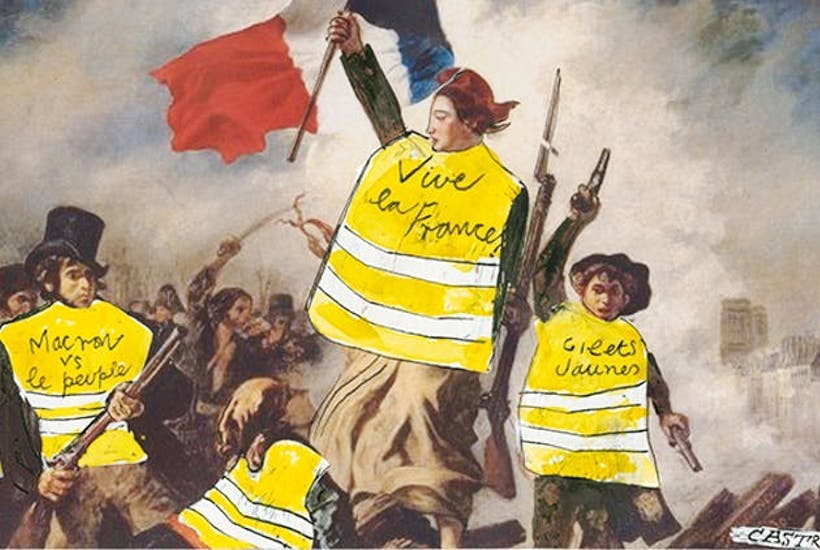The ninth weekend of the gilet jaune protest movement was a mixed result for Emmanuel Macron. The nationwide demonstrations were relatively peaceful with only minor skirmishes between protesters and police, but numbers were up, with a total of 84,000 taking to the streets, 34,000 more than the previous Saturday.
This is an impressive figure given that we are in the depth of the northern hemisphere winter, but what are rain, sleet and sub-zero temperatures when the future of one’s country is at stake?
With that in mind Macron launches his Big Debate on Tuesday in the hope that consultation will supplant confrontation and a consensus can be reached behind which the country can unite and move forward.
The odds of that happening appear to be slim. Skepticism is the order of the day with a poll last week reporting that 70 percent of those asked believe the nationwide Big Debate, which runs until March 15, will fail in its aim.
Why the pessimism? Because France has been here before. In 2009 president Nicolas Sarkozy launched with much fanfare a debate on ‘French identity’ amid growing unease about Islam and immigration. The indignation of politicians and journalists on the left was so great that Sarkozy ended up apologizing for the initiative.
It should be remembered, of course, that Macron still has his hardcore supporters, despite the impression in recent weeks that the whole country is against him. On the contrary, one young engineer from Toulouse has organized a march in Paris on January 27 to ‘support the Republic’, and it’s predicated it will draw a significant number to the capital.
Calling themselves the ‘foulards rouges’ (red scarves), one poster shows a man’s flexed bicep, around which is wrapped a red scarf next to the words ‘Je Ne Suis Pas Gilet Jaune’.
The government will be heartened to learn it still has some friends but it will tremble at the thought of what may happen a week on Sunday if truck drivers and brickies wearing yellow vests confront engineers and techies wearing red scarves.
Both sides must respect one another, particularly the red scarves, who perhaps should refrain from displaying any more provocative posters. France has been brought to the brink of insurrection by the sneering contempt shown by the minority towards the majority. The former are mainly middle-class metropolitans, whose ascent to power began in 1968, and who in the decades since have relentlessly lectured and hectored their compatriots.
In response to a growing number of assaults on journalists, the left-leaning newspaper Le Monde recently asked ‘why do the gilets jaunes hate the media’? The answer is because for many in France the media and political class are indistinguishable; the latter are out of reach but reporters are not. For years the white working-class have had their lives lampooned and been smeared with a multitude of ‘isms’ and ‘phobias’ by politicians and journalists who, simultaneously, champion open borders because they believe Europe owes it to the third world. They don’t understand that the misery and poverty they think exists only in Africa and the Middle East is also found closer to home. The victims of globalization are everywhere.
What France (and the rest of Europe) is witnessing is not a populist revolt but a politically incorrect one. People have had enough of being mocked and marginalized by what George Orwell described as ‘a dreary tribe of high-minded women and sandal-wearers and bearded fruit-juice drinkers who come flocking towards the smell of “progress” like bluebottles to a dead cat.’
The difference between now and 1936, when Orwell wrote that pungent depiction, is that then the ‘dreary tribe’ had no influence. They were swept into cultural power in the 1960s but they are in the process of being swept back out in the second decade of the 21st century. This will be hard to bear for progressives after a half-century of hegemony. The silent majority has found its voice and it demands it be listened to. A failure to do so will have dire consequences for Europe.
On Sunday Emmanuel Macron published a 2,300-word letter to the nation as a prelude to the debate. Emphasizing that it will be ‘neither an election nor a referendum’, the president promised that no subject will be ‘banned’. He then contradicted himself by implying that the wealth tax will not be reinstated and corporate income tax will not be increased.
In launching the debate Macron has taken a big risk. He’s asking the hoi polloi for their questions and they can be guaranteed to provide them. Many will offend this politically correct progressive president but he’s got to provide at least some of the right answers because if he doesn’t then he and the Fifth Republic are finished.
This article was originally published on The Spectator’s UK website.


















